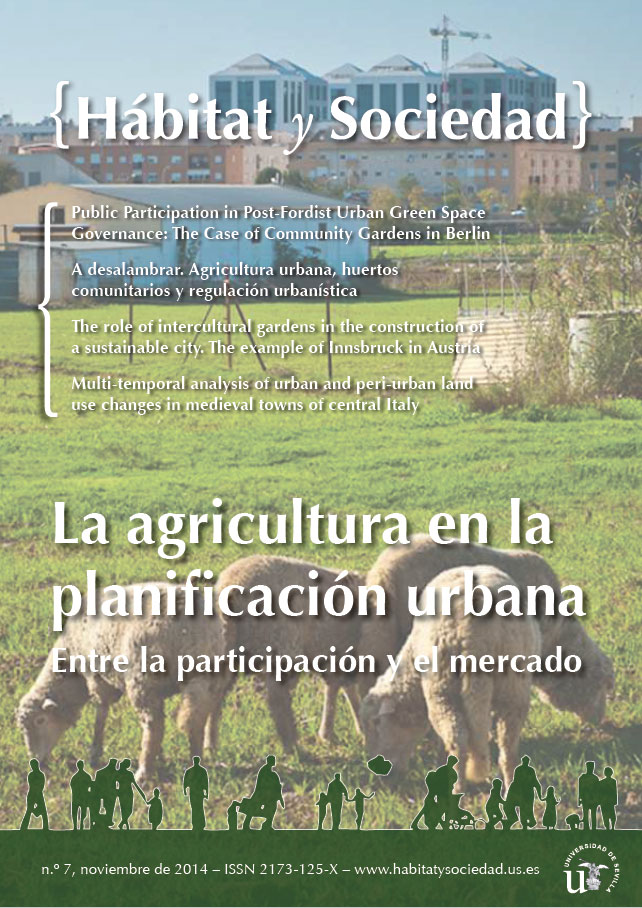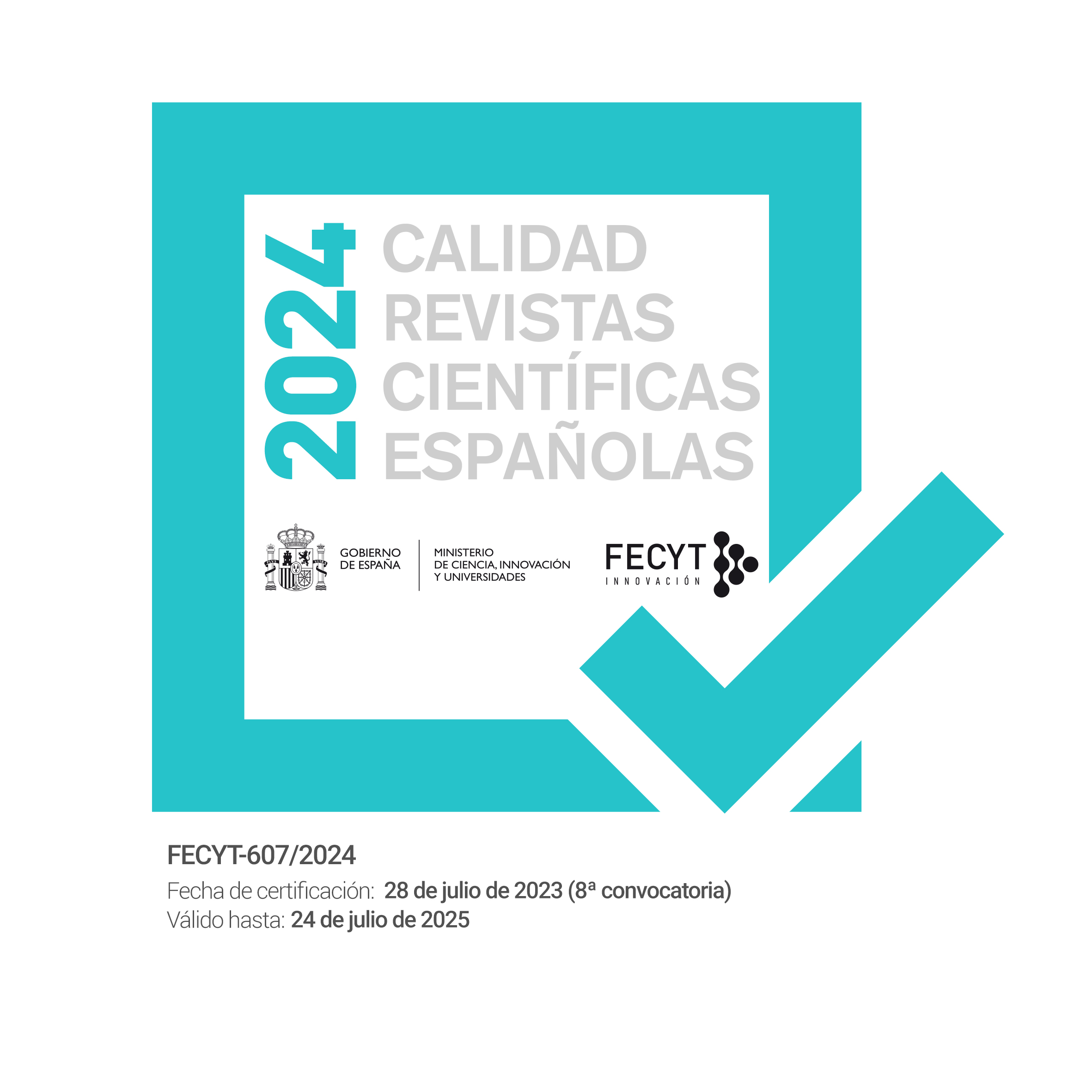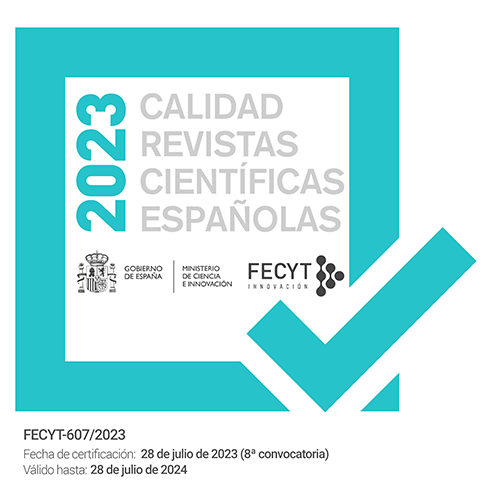Public Participation in Post-Fordist Urban Green Space Governance: The Case of Community Gardens in Berlin
DOI:
https://doi.org/10.12795/HabitatySociedad.2013.i7.02Keywords:
Huertos comunitarios, participación ciudadana, ciudades posfordistas, políticas urbanas neoliberalesAbstract
This article examines citizen participation in the governance of contemporary urban green space. Rather than exploring normative questions of ideal forms of participatory democracy, it focuses on changing roles and relationships between local state and non-state actors in order to identify and explain the changing nature of participation. I argue that neoliberal urban restructuring has changed the conditions for participationand thus participation itself in fundamental ways and that we need an account of changes in statehood and governance in order to capture this conceptually. Based on the case of community gardens in Berlin, the article discusses the extent to which this changed relationship is expressed by current citizen participation as well as the potential and problems that result from it. My empirical results show the emergence of a new political
acceptance of autonomously organized projects and active citizen participation in urban green space governance. The central argument of this article is that this new acceptance can be conceptualized as an expression of the neoliberalization of cities. Nevertheless, this neoliberal strategy at the same time leads to complex and contradictory outcomes and the resulting benefits are also acknowledged.
Downloads
References
ARMSTRONG, Donna. A survey of community gardens in upstate New York: Implications for health promotion and community development. Health &
Place, 2000, vol. 6, p. 319-327.
AMIN, A. Local community on trial. Economy and Society, 2005, 34.4, p. 612-33.
AYLETT, A. Conflict, Collaboration, and Climate Change: Participatory Democracy and Urban Environmental Struggles in Durban, South Africa. International Journal of Urban and Regional Research, 2010, 34.3, p. 478-495.
BAKER, L. Tending cultural landscapes and food citizenship in Toronto’s community gardens. Geographical Review, 2004, 94.3, p. 305-25.
BBR (Bundesamt für Bauwesen und Raumordnung) Zwischennutzung und neue Freiflächen. Städtische Lebensräume der Zukunft. Projekt des Forschungsprogramms der ‘Projektplanung Aufbau Ost’ [Temporary use
and new open spaces. Urban living space for the future. Project of the research program of ‘Project Planning Development East’]. Berlin: BBR, 2004.
BECHER, D. Bringing conflict and representation back in: intermediation and collective action as participatory institutions. International Journal of Urban and Regional Research, 2010, 34.3, p. 496-511.
BODENSCHATZ, H., V. HEISE and J. KORFMACHER. Schluß mit der Zerstörung? Stadterneuerung und städtische Opposition in West-Berlin, Amsterdam und London [End destruction? Urban renewal and urban opposition inWest Berlin, Amsterdam and London]. Gießen: Anabas,
BONDI, L. and N. LAURIE. Working the spaces of neoliberalism: activism, professionalisation and incorporation. Introduction. Antipode, 2005, 37.3, p.
–401.
BRAND, K-W., D. BÜSSER and D. RUCHT. Aufbruch in eine andere Gesellschaft. Neue soziale Bewegungen in der Bundesrepublik [Departure for another society. New social movements in the Federal Republic].
Frankfurt/ Main: Campus, 1986.
BRENNER, N. and N. THEODORE. Cities and the geographies of ‘actually existing neoliberalism’. Antipode, 2002a, 34.3, p. 349-379.
BRENNER, N. and N. THEODORE (eds.) Spaces of neoliberalism: urban restructuring in Western Europe and North America. Oxford and Boston: Blackwell, 2002b.
BRENNER, N. and N. THEODORE. Neoliberalism and the urban condition. City, 2005, 9.1, p. 101-107.
CET-0 and STUDIO URBAN CATALYST. Raumpioniere Berlin [Berlin space pioneers]. Berlin: Studie i.A. der Senatsverwaltung für Stadtentwicklung, Abtl. I Stadt- und Freiraumplanung, 2004.
EA.UE (ed.) Kein Geld für Stadtgrün? Finanzierungs- und Managementstrategien für Grünflächen in Berlin und polnischen Städten (Konferenzbericht) [No money for public greenery? Financial and management strategies forgreen spaces in Berlin and Polish cities. Conference proceedings]. Berlin: Europäische Akademie für städtische
Umwelt EA.UE, 2000.
EISSNER, C. and S. HEYDENREICH (eds.) Baulücke? Zwischennutzen! Ein Ratgeber für denWeg von der Brachfläche zur Stadtoase [Vacant lot? Temporary use! A guide for the transformation of a vacant lot into an urban
oasis]. Bonn: Stiftung Mitarbeit, Arbeitshilfen Nr. 32, Verlag Stiftung Mitarbeit, 2004.
ELWOOD, S. Neighborhood revitalization through ‘collaboration’: assessing the implications of neoliberal urban policy at the grassroots. GeoJournal,
, 58.2/3, p. 121-130.
ELWOOD, S. Partnerships and participation: reconfiguring urban governance in different state contexts. Urban Geography, 2004, 25.8, p. 755-770.
ESSER, J. Konzeption und Kritik des kooperativen Staates [Concept and critique of the cooperative state]. In C. GÖRG and R. ROTH (eds.), Kein Staat zu machen. Zur Kritik der Sozialwissenschaften [Nothing
to write home about. A critique of the social science]. Münster: Westfälisches Dampfboot, 1998.
ETZIONI, A. The spirit of community. Rights, responsibilities, and the communitarian agenda. New York: Crown Publishers, 1993.
EVERS, A. Bürgergesellschaft und soziales Kapital. Die politische Leerstelle im Konzept Robert Putnams [Civic society and social capital. The political void in the concept of Robert Putnam]. In M. HAUS (ed.) Bürgergesellschaft, soziales Kapital und lokale Politik. Theoretische Analysen und empirische Befunde [Civic society, social capital and local politics. Theoretical analysis and empirical findings], Opladen: Stadtforschung aktuell Band 86. Leske+Budrich, 2002.
GEDDES, M. Partnership and the limits to local governance in England: institutionalist analysis and neoliberalism. International Journal of Urban and Regional Research, 2006, 30.1, p. 76-97.
GHOSE, R. The complexities of citizen participation through collaborative governance. Space and Polity, 2005, 9.1, p. 61-75.
GRÖNING, G. Kampfesmutige Laubenpieper. Kleingärten und Politik in Berlin zwischen 1985 und 1995 [Rebellious allotment gardeners. Allotment
gardens and politics in Berlin between 1985 and 1995]. In A. HOLL and E. MEYER-RENSCHHAUSEN (eds.), Die Wiederkehr der Gärten [The return of
the gardens], Innsbruck: Studien-Verlag, 2000.
HAIDLE, I. and C. ARNDT. Urbane Gärten in Buenos Aires [Urban gardens in Buenos Aires]. Berlin: ISR Diskussionsbeiträge Heft 59. Institut für Stadt- und Regionalplanung, Technische Universität Berlin,
HALL, T. and P. HUBBARD (eds.) The entrepreneurial city: geographies of politics, regime, and representation. New York: Wiley-Academy, 1998.
HARVEY, D. From managerialism to entrepreneurialism: the transformation in urban governance in late capitalism. Geografiska Annaler Series, 1989, B 71.1, p. 3-17.
HASSELL, M. v. Community gardens in NewYork City: place, community and individuality. In P. BARTLETT (ed.), Urban Place, Cambridge, MA: MIT
Press, 2005.
HERBERT, S. The trapdoor of community. Annals of the Association of American Geographers, 2005, 95.4, p.850–65.
HIRSCH, J. Der Sicherheitsstaat. Das ‘Modell Deutschland’, seine Krise und die neuen sozialen Bewegungen [The security state. The ‘German model’, its crisis and new social movements]. Frankfurt/Main: Europäische Verlagsanstalt, 1980.
HIRSCH, J. Sozialstaatskrise und das sozialdemokratische Dilemma [Crisis of the social state and the social democratic dilemma]. Widersprüche, 1982, 2.2, 51 ff.
HOLM, A. Urban renewal and the end of social housing. The roll out of neoliberalism in East Berlin’s Prenzlauer Berg. Social Justice, 2006, 33.3, p. 114- 128.
IMRIE, R. and M. RACO (eds.) Urban renaissance? New Labour, community and urban policy. Bristol: Policy Press, 2003.
JESSOP, B. Liberalism, neoliberalism, and urban governance: a state-theoretical perspective. In N. BRENNER and N. THEODORE (eds.), Spaces of neoliberalism: urban restructuring in Western Europe and
North America. Oxford: Blackwell, 2002.
KRÄTKE, S. City of talents? Berlin’s regional economy, socio-spatial fabric and ‘worst practice’ urban governance. International Journal of Urban and Regional Research, 2004, 28.3, p. 511-29.
KRÄTKE, S. and F. SCHMOLL. Der lokale Staat —-“Ausführungsorgan’ oder ‘Gegenmacht’” [The local state— executive or countervailing power].
PROKLA. Zeitschrift für kritische Sozialwissenschaft , 1987, 17.3, p. 30-72.
KRUG-GBUR, V. and L. PREISLER-HOLL. Schritt für Schritt aus der ‘grünen’ Krise [Step by step out of the ‘green’ crisis]. Stadt und Raum, 2/2004, 94-97.
KRUMMACHER, M., R. KULBACH, V. WALTZ and N. WOHLFAHRT. Soziale Stadt, Sozialraumentwicklung, Quartiersmanagement. Herausforderungen für Politik, Raumplanung und Soziale Arbeit [Social city, social space
development, neighbourhood management. Challenges for polity, spatial planning and social work]. Opladen: VS Verlag, 2003.
LEBUHN, H. Stadt in Bewegung. Mikrokonflikte um den
öffentlichen Raum in Berlin und Los Angeles [City in
movement. Micro conflicts around public space in Berlin
and Los Angeles]. Münster: Westfälisches Dampfboot,
LINDENBERG, M. Aufgeklärte Herrschaft im aktivierenden
Staat. Anmerkungen zu den Thesen der
Hamburger Sozialsenatorin ‘zur Zukunft der sozialen
Arbeit in Hamburg’ [Enlightened rule within
the activation state. Comments on the thesis of the
Hamburg social senator ‘for the future of social
work in Hamburg’]. Widersprüche, 2002, 22.84, p.
-87.
LOHRBERG, F. Stadtnahe Landwirtschaft in der Stadtund
Freiraumplanung [Urban agriculture as a subject
of urban and open space planning]. PhD dissertation,
Fakultät Architektur und Stadtplanung, Institut für
Landschaftsplanung und Ökologie. Stuttgart: Universität
Stuttgart, 2001.
MACKINNON, D. Managerialism, governmentality
and the state: a neo-Foucauldian approach to local
economic governance. Political Geography, 2000,
3, p. 293-314.
MATHÉY, K. (ed.) Urban agriculture (special issue).
Trialog –Zeitschrift für das Planen und Bauen in der
Dritten Welt [Trialog – A Journal for Planning and
Building in the Third World], 2000, 65.
MAYER, M. Post-Fordist city politics. In A. AMIN (ed.),
Post-Fordism. A reader. Oxford: Blackwell, 1994.
MAYER, M. Soziales Kapital und Stadtentwicklungspolitik
—ein ambivalenter Diskurs [Social capital and
urban development politics— an ambivalent discourse].
In M. HAUS (ed.), Bürgergesellschaft, soziales
Kapital und lokale Politik. Theoretische Analysen und
empirische Befunde. Stadtforschung aktuell Band 86.
Opladen: Leske+Budrich, 2002.
Mayer, M. The onward sweep of social capital: causes
and consequences for understanding cities, communities
and urban movements. International Journal
of Urban and Regional Research, 2003, 27.1, p.
-132.
Meissle, K. Brachland in Berlin. Zur Bedeutung transitorischer
Räume in der Stadt [Vacant land in Berlin.
The salience of transitoric space in the city].
Stadt und Grün 4/1998, p. 247-251.
MEYER-RENSCHHAUSEN, E. Unter dem Müll der Acker
[Below the waste the field]. Community Gardens in
New York City. Königstein/Taunus: Konzepte / Materialien
Band 2 Ulrike Helmer Verlag, 2004.
MEYER-RENSCHHAUSEN, E. (ed.) Die Gärten der
Frauen —Zur sozialen Bedeutung von Kleinstlandwirtschaft
in Stadt und Land weltweit [The gardens of women—
the social salience of micro agriculture in urban
and rural areas in the world]. Herbolzheim: Centaurus-
Verlag, 2002.
PAINTER, J. and M. GOODWIN. Local governance
after Fordism: a regulationist perspective. In G.
STOKER (ed.), The new politics of British local government.
Basingstoke: Macmillan, 2000.
PECK, J. and A. TICKELL. Neoliberalizing space. Antipode,
, 34.3, p. 380-404.
Porter, L. and K. SHAW (eds.) Whose urban renaissance?
An international comparison of urban regeneration
strategies. London: Routledge, 2009.
REYNOLDS, R. On guerrilla gardening: a handbook for
gardening without boundaries. London: Bloomsbury,
ROSE, N. The death of the social? Refiguring the territory
of government. Economy and Society, 1996, 25.3,
p. 327-356.
ROSOL, M. Gemeinschaftsgärten in Berlin. Eine qualitative
Untersuchung zu Potenzialen und Risiken bürgerschaftlichen
Engagements im Grünflächenbereich vor dem Hintergrund
des Wandels von Staat und Planung [Community
gardens in Berlin. A qualitative analysis concerning
potentials and risks of civic engagement in the green sector
against the background of changing statehood and spatial
planning]. Berlin: Mensch-und-Buch-Verlag, 2006.
ROTH, R. Lokale Demokratie ‘von unten’. Bürgerinitiativen,
städtischer Protest, Bürgerbewegungen
und neue soziale Bewegungen in der Kommunalpolitik
[Local democracy ‘from below’. Citizens’ action
committees, urban protest, citizen movements
and new social movements in municipal politics].
In R. ROTH and H. WOLLMANN (eds.), Kommunale
Politik. Politisches Handeln in den Gemeinden.
Opladen: Leske+Budrich, 1994.
ROTH, R. Die dunklen Seiten der Zivilgesellschaft
—Grenzen einer zivilgesellschaftlichen Fundierung
von Demokratie [The dark sides of civil society— limits
of a civil society based democracy]. Forschungsjournal
Neue Soziale Bewegungen, 2003, 16.2, p. 59-73.
RÜDDENKLAU, W. Störenfried [Troublemaker]. Berlin: Verlag BasisDruck, 1992.
SALDIVAR-TANAKA, L. and M. E. KRASNY. Culturing
community development, neighborhood open space,
and civic agriculture: the case of Latino community
gardens in New York City. Agriculture and Human
Values, 2004, 21.4, p. 399-412.
SCHMELZKOPF, K. Urban community gardens as
contested space. Geographical Review, 1995, 85.3, p.
-381.
SCHMELZKOPF, K. Incommensurability, land use,
and the right to space: community gardens in New
York City. Urban Geography, 2002, 23.4, p. 323-343.
SCHRÖDER, T. Der Park lebt nicht vom Staat allein
[A park does not live on the state alone]. Topos
/2000, p. 68-74.
SILVER, H., A. SCOTT and Y. KAZEPOV. Participation
in urban contention and deliberation. International
Journal of Urban and Regional Research, 2010, 34.3, p.
-477.
STAEHELI, L. A., D. MITCHELL and K. GIBSON.
Conflicting rights to the city in New York’s community
gardens. GeoJournal, 2002, 58.2/3, p. 197-205.
SWYNGEDOUW, E. Governance innovation and the
citizen: the janus face of governance-beyond-thestate.
Urban Studies, 2005, 42.11, p. 1991-2006.
THIEL, W. Selbsthilfe und ‘informeller Sektor’ auf
der lokalen Ebene [Self-help and the ‘informal sector’
on the local scale]. In R. ROTH and H. WOLLMANN
(eds.), Kommunale Politik. Politisches Handeln
in den Gemeinden [Municipal politics. Political acting in
municipalities], Opladen: Leske+Budrich, 1994.
Downloads
Published
How to Cite
Issue
Section
License
Copyright (c) 2017 De los autores y Editorial Universidad de Sevilla

This work is licensed under a Creative Commons Attribution-NonCommercial-ShareAlike 4.0 International License.
Los textos publicados se considerarán propiedad intelectual de los autores y de la revista. Podrán ser usados para usos educativos y académicos, citando al autor y la publicación, con la dirección electrónica exacta. En todo caso, deberá comunicarse este tipo de uso y pedir la autorización del mismo a la dirección de la revista.
Los autores/as que publiquen en esta revista aceptan las siguientes condiciones:
- Los autores/as conservan los derechos de autor y ceden a la revista el derecho de la primera publicación, con el trabajo registrado con la licencia de atribución de Creative Commons, que permite a terceros utilizar lo publicado siempre que mencionen la autoría del trabajo y la primera publicación en esta revista.
- Los autores/as pueden realizar otros acuerdos contractuales independientes y adicionales para la distribución no exclusiva de la versión del artículo publicado en esta revista (p. ej., incluirlo en un repositorio institucional o publicarlo en un libro) siempre que indiquen claramente que el trabajo se publicó por primera vez en esta revista.
- Se permite y recomienda a los autores/as publicar su trabajo en Internet (por ejemplo en páginas institucionales o personales) antes y durante el proceso de revisión y publicación, ya que puede conducir a intercambios productivos y a una mayor y más rápida difusión del trabajo publicado (véase The Effect of Open Access).














